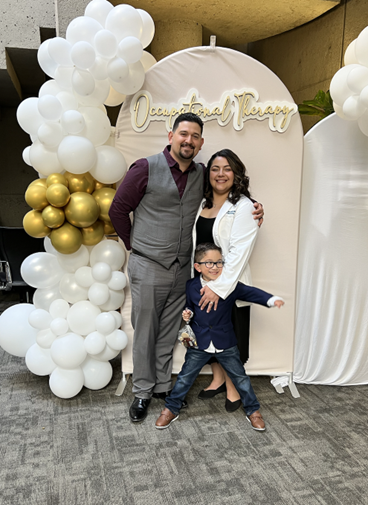Planning a White Coat Ceremony? Here are 6 Valuable Tips to Guide you Through the Process
The white coat ceremony (WCC) in occupational therapy (OT) consists of the oath of commitment to the OT profession and the symbolic act of receiving and donning a white medical coat or “bata de doctor” in Spanish. Although not every program holds a WCC, for those that do, it typically honors the end of the didactic portion of the program and indicates the start of clinical fieldwork experience.
In April 2023, I was a part of the committee that helped plan and coordinate a WCC for the Samuel Merritt University (SMU) OT program. I hope that sharing my experience with this process and offering tips helps students who wish to pursue a WCC for their program.
Here are six tips for planning a WCC:
- Define your purpose: Why does your OT program want a WCC? What does it mean to your cohort? The SMU OT 2023/2024 cohort consists of 47 students from different cultural backgrounds. Many of my classmates, including myself, are students of color, parents, and/or the first in their families to receive a higher level of education. The cohort was surveyed, and all 47 responses were recorded and forwarded to the administrative staff. The purpose identified by the cohort was truly moving; many of my peers wanted a WCC to celebrate their accomplishments with their families who supported them in pursuing advanced degrees. My classmates also wanted to change the narrative around the symbol of the white coat, as traditionally, the white coat was synonymous with white men and the medical model. We wanted to represent a commitment to diversity in the medical field and a holistic model of care. Understanding your cohort's purpose helps guide your path in planning a meaningful event.
- Look to past events: Learn from others, watch videos, and ask questions of peers who were in past cohorts or of peers in other programs. YouTube, Google, and TikTok are helpful resources for seeing how other programs have executed their WCCs. By looking to past events, you can have a great foundation for your ceremony.
- Start early: The planning for the WCC started in September 2022 and ended in mid-April 2023. In my experience, 8 months was just enough time to reserve the date and space, order coats, and get supplies ready. The long to-do list also included organizing student and faculty speakers for the event, soliciting food donations, planning decorations, recruiting volunteers, making and printing programs, distributing tickets, arranging for IT support, creating the student slideshow, making a seating chart for students and guests requiring accommodations, and planning and running a rehearsal. The earlier you can start crossing items off your to-do list, the better for your mental health and stress levels.
- Maintain open lines of communication: Communication is imperative, especially when communicating with faculty, administrators, and your cohort as a whole. Be open and transparent in stating the purpose of the WCC; advocacy may be a big part of your job. Include your cohort in as many decisions as possible by sending out surveys, emails, and announcements.
- Expect the unexpected, always: Creating a day-of-event timeline is very useful and helpful with event planning. However, remember to have flexibility because things don’t always go as planned, and that’s okay! Someone’s family might be late and need to be seated during the ceremony. A classmate might forget part of their speech and need to improvise. The fire alarm might go off as you and your classmates are taking pictures (true story!). As future OTs, being flexible and adapting to situations is our expertise.
- Remember that you are human: Remember that you engage in many life roles. Your time is important, and you must make time for yourself and your valued occupations.
I hope these 6 tips in planning a WCC benefit you in your upcoming WCC event. Remember your purpose; this will help ease the planning process.
Cristyn Amaral is a third-year OTD student at Samuel Merritt University. She is first-generation in the United States, with most of her family residing in El Salvador. Cristyn participates in many life roles, including being a parent, spouse, friend, mentor, and cohort representative. When not studying, she enjoys making pupusas for her family and spending time outdoors.
